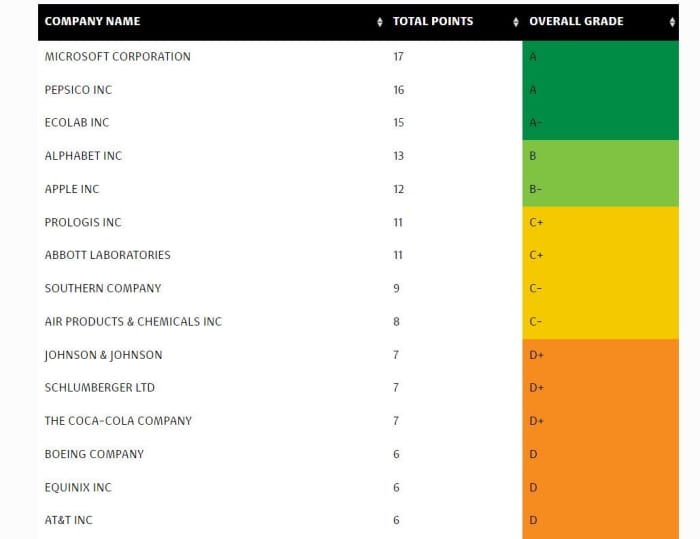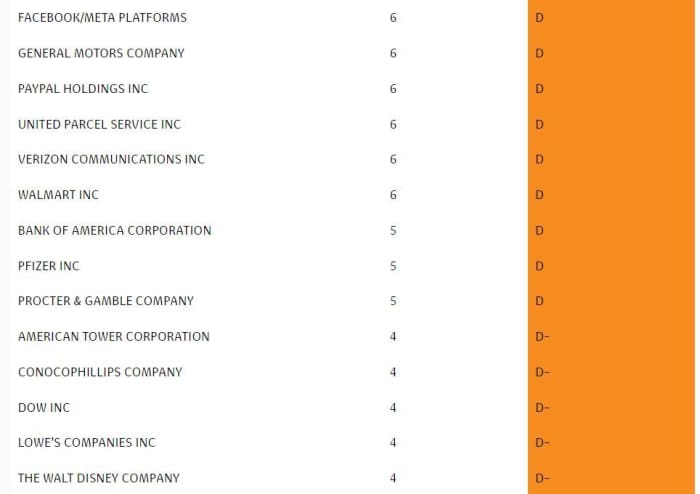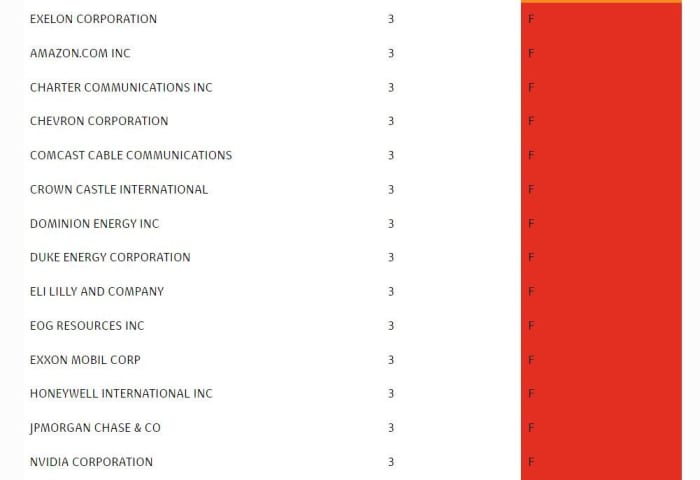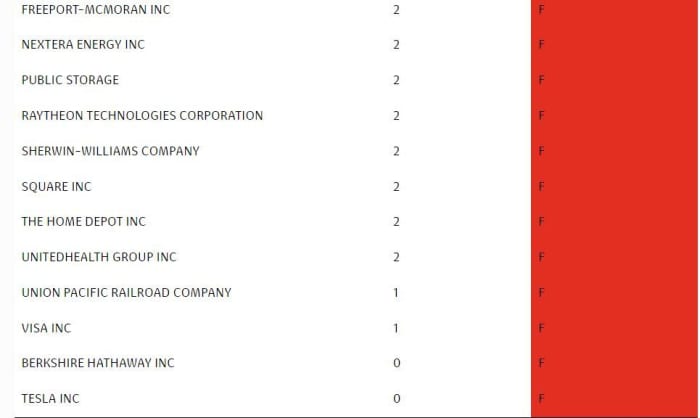This post was originally published on this site
Most major corporations tell customers and shareholders they’re on the road to zero emissions in the coming years and decades, doing their part to slow global warming. But not very many have shown convincing evidence to date.
Too many still rely on buying permission to pollute through carbon offsets rather than changing how they source energy, says sustainable-investing advocate As You Sow. The nonprofit on Thursday issued its periodic report, “Road to Zero Emissions: 55 Companies Ranked on Net Zero Progress“.
The report grades major companies on their progress in aligning emissions reductions with the Paris Agreement goal of holding warming to 1.5 degrees Celsius.
“The next few years are critical in achieving emissions reductions and setting a less catastrophic path for the global climate,” said Danielle Fugere, president of As You Sow. “To address the current gap between goals and action, As You Sow’s scorecard weights near-term, year-over-year greenhouse-gas emissions reductions as the largest scorecard component.
Of the 55 companies ranked, only three companies — Microsoft
MSFT,
PepsiCo.
PEP,
and Ecolab
ECL,
— received an overall “A” grade, though some companies got higher marks for certain efforts. Only two companies, Google-parent Alphabet
GOOGL,
GOOG,
and Apple
AAPL,
received an overall “B” grade.

As You Sow
“Approximately 84% of the assessed companies received total scores of “D” or “F,” underscoring that we have a long way to go toward net-zero progress,” said David Shugar, As You Sow’s climate initiative manager and lead report analyst. The group is usually busy ahead of proxy season, pushing for initiatives or board changes to favor climate-conscientious seats. Early this year, it played a part in moving Coca-Cola
KO,
toward more reusable bottles to cut down plastic waste.
Thursday’s report also finds 64% of assessed companies are not yet reporting the full range of their Scope 3 emissions, which covers their supply chains, or those emissions often out of a company’s direct control. Scope 1 emissions are those that a company controls, such as emissions from headquarters. Scope 2 are the emissions linked to the energy a company uses, such as the gasoline in a fleet of vehicles or the emissions of the electricity grid.
Microsoft said in 2020 it wants to clean up the carbon footprint at its own home base and throughout its supply chain, believing it can go “carbon negative” by 2030.

As You Sow
Carbon negativity is the reduction of a carbon footprint to less than neutral, with the net effect of removing carbon dioxide from the atmosphere rather than adding it. Only a handful of companies have committed to net-negative or, as they sometimes put it, “climate-positive, greenhouse-gas emissions targets. Microsoft believes by 2050 it can remove all the carbon it has emitted since the company’s 1975 founding.
Investors and businesses joining in on larger initiatives, including the Climate Action 100 and the Science Based Targets initiative, which align polluting measures and disclosures, although on a voluntary basis, have highlighted the expectation that companies must take concrete action to reduce greenhouse-gas emissions.
The As You Sow report also addresses the use of offsets to achieve reduction goals.
A carbon offset broadly refers to a reduction in GHG emissions or an increase in carbon storage, typically by buying someone else’s excess government-issued allowance or through land restoration or the planting of trees.

As You Sow
As You Sow and others argue that carbon offsets should not substitute for actual reduction measures in the company’s value chain, for instance shifting from fossil fuel-based energy to renewable sources.
Perhaps surprisingly, one of As You Sow’s lowest grades goes to electric-vehicle pioneer Tesla
TSLA,
whose revenue-generating profile has historically relied on selling its excess carbon credits, awarded because all of its production line is dedicated to zero-emission autos.
Read: Elon Musk invites UAW to hold union vote at Tesla

As You Sow
While 12 of the assessed companies have set net-zero goals across all scopes of emissions, none commits to avoiding the use of carbon offsets to achieve those goals.
“Carbon offsets cannot substitute for on-the-ground reductions by companies,” Shugar said. “To achieve net-zero emissions, companies must take action at the level of their own operations and supply chains. Purchasing carbon offsets will not solve the climate crisis.”


